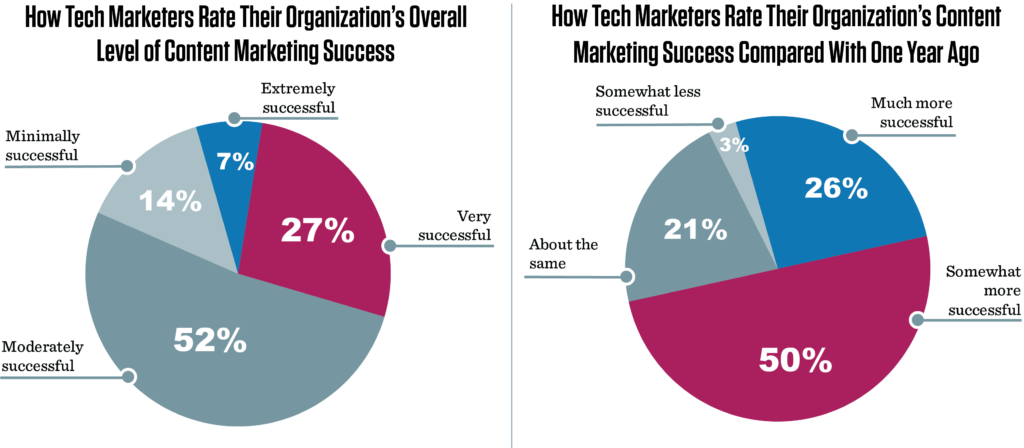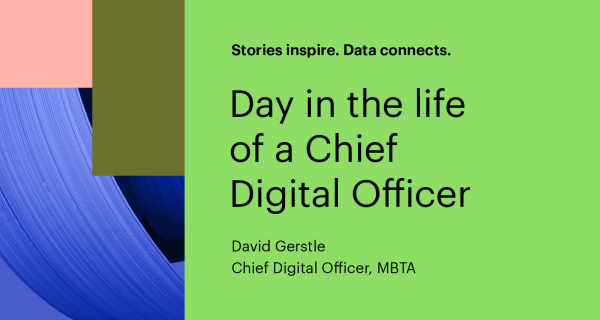Tech marketers seem satisfied with their content marketing efforts, according to the 2020 edition of the Content Marketing Institute’s Technology Content Marketing study (sponsored by IDG). The majority of tech marketers (52%) say their organization is moderately successful with content marketing, while another 34% say their efforts are extremely or very successful.
Asked to rate their content marketing maturity, 35% said they’ve achieved a “mature” level – finding success yet challenged with integration across the organization. Another 10% said they’ve reached a “sophisticated” level – providing accurate measurements to the business and scaling across the organization.
In addition, three-quarters (76%) say their content marketing efforts are more successful than they were a year ago.

Challenges remain, of course, particularly around creating content that appeals to discerning technology buyers. IDG’s own Role & Influence study speaks to the complexity of IT purchases: The enterprise tech buying committee comprises an average of 21 stakeholders who cut across IT and business functions.
No surprise, then, that a focus on content quality and quantity was one of the top three priorities in the year ahead for tech marketers in the CMI study.
Creating a sustainable content development engine has long been a conundrum for marketing teams that traditionally don’t invest heavily in dedicated, in-house content creation. Nearly half of the more than 250 respondents (46%) in the CMI study say they have between 2-5 people dedicated to content marketing; one-quarter (25%) say they have a one-person team, and nearly one in five (19%) has no dedicated resource for content marketing.
Small internal teams require organizations to rely on partners for content development; in the CMI study, 88% of tech marketers say they outsource content creation.

For many, there lies the biggest challenge: finding a trusted partner to help you produce high-quality content, at scale, over an extended period. The search is not getting any easier as more agencies add content services to their traditional advertising or design portfolios, crowding the landscape and making it harder to find the best fit for your needs.
Picking the right partner for content development is critical to the success of your marketing programs. Here are a few questions to ask when vetting marketing services providers:
- How well does the partner know the target audience? In the CMI study, improving the quality and conversion rates of target audiences was tech marketers’ top priority. But their top challenge is creating content that appeals to multi-level roles within the target audience. If your partner doesn’t have direct access (i.e., 1st party data) to the audiences you’re targeting, they will be hard-pressed to create content that resonates with those buyers, especially ones as diverse as the typical tech buying committee.
- How is the partner staffed to produce the content? Do they have in-house talent to oversee content development? What’s the background of their content creators? Pro tip: Former tech journalists often bring the best skill set to content development, for a few important reasons:
- They understand the audience
- They are trained in the art of storytelling
- They are skilled at asking the right questions to unearth a compelling narrative
- They understand the technology and have a knack for translating complex topics to make them relevant to both IT and business stakeholders. In the CMI study, communicating complex content was No. 3 on the list of challenges.
- How broad and deep are their capabilities? Look for a partner with a broad portfolio of products and services that can suit different objectives. The content marketer’s toolbox spans many types, from blog posts and white papers to social media and email. The best partners will help you create a content strategy that provides the optimal mix of content types to meet your goals. And they’re also able to adapt quickly to unexpected changes in the market. Nowhere is that more evident in the current shift from live events to digital events. Make sure your agency has the expertise to help you pilot and quickly activate innovative approaches to content, including virtual events, podcasts, and new spins on traditional formats such as webcasts.
- How well can they scale? Content marketing is insatiable: It must be fed regularly to thrive. Just like internal teams, however, some agency partners are not structured to churn out content at the pace and volume required to engage and nurture audiences across different channels and different stages of the buyer journey. Look for a partner that has an established track record in creating and distributing high-quality content, at scale, across all forms of media.
In the months ahead, tech marketing budgets will come under even more scrutiny than usual as organizations adjust to both the short- and long-term impacts of the global pandemic. Finding the right strategic partner for content marketing will help marketers, like you, ride out the storm and better position themselves for future success.
Follow me at @roboregan






